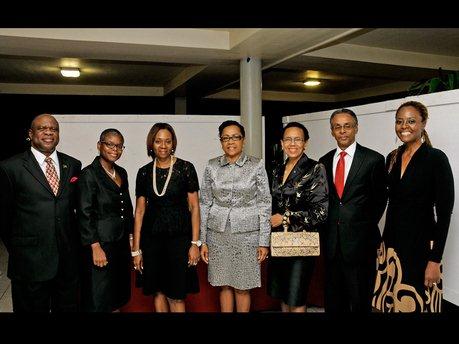ADDRESS by
SEN. THE HON. ALLYSON MAYNARD GIBSON
ATTORNEY-GENERAL AND MINISTER OF LEGAL AFFAIRS
TO THE GRADUATES
NORMAN MANLEY LAW SCHOOL
KINGSTON, JAMAICA
SATURDAY 28TH SEPTEMBER, 2013
GREETINGS AND SALUTATIONS

It is an honour and great pleasure to be here this evening, among friends, as we celebrate and honour the Region’s newest lawyers. I congratulate all of you and your family, tutors and friends who have supported you to this important day in your lives. Your certificates equally belong to your parents and significant others who have supported you on this journey.
Some 30 years ago I was in the same position that you are now in: excited, relieved, scared, proud and so much more! I assure you, this evening that you are about to commence a profession that is not only a learned profession but is one of the most exciting, if not THE most exciting profession in the world.
I asked several young people in Nassau what they thought law school graduates wanted to hear about. They said “jobs and money”. I also asked them where they see themselves in 10 years. The answer was “I want to be a well-known and very successful lawyer”. This translated to “I want to be rich”.
Learn. Return. Earn. That is the tripod upon which stands success as a lawyer. If the law is your passion and if every day you realize that there is a lot for you to learn and if daily you work hard in pursuit of excellence, word will spread of your reputation for excellence. That’s how you become a “well known and successful lawyer”. There will be such demand for your services that you will earn. But note, success comes from reputation, which can’t be bought. You will gain satisfaction, knowledge, and so much more [which also can’t be bought] from giving back or returning.
Alas, this is not a one minute speech. Tonight, having answered what you might want to hear, I want to leave others messages with you.
You are coming into the profession at an exciting time – one involving tremendous change – change in how we practice within law firms (led by the use of technology); change in the Courts’ processes (led by technology and the awareness of the value of JUDICIAL TIME, a treasured and limited commodity); increasing focus on international order/norms rather than domestic order/norms (examples are routine reference to various UN Conventions and regimes of international organizations such as FATF and CFATF, WTO and EPA); and in the Region, continued development of Caricom and the CCJ. This change can be summarized in a word “globalization”.
The golden thread that runs through globalization, or regionalism, or any grouping of states or international organizations, is the Law. Every regional grouping, every trade pact, every formal expression of cooperation is done by treaty, or some other formal international instrument, whether multi-lateral or bilateral. The Law touches every area of life and increasingly in this era, domestic law and international law are intertwined.
The Region needs people who understand and speak the language of international law. You are graduating at a time when you will probably need to know how to draft petitions for the Inter-American Commission or Court of Human Rights; the International Court of Justice (ICJ), the Dispute Settlement Panel of the World Trade Organization (WTO), or the International Tribunal for the Law of the Sea (ITLOS) and regionally, the Caribbean Court of Justice. Some of you may eventually sit as a member of that eminent court.
Today, the practice of law has developed to the extent that an attorney, before representing a foreign client, may have to possess knowledge of the laws of country of the client’s domicile. For example, under the laws of several Caribbean jurisdictions in respect of money-laundering, an attorney would have to know the tax laws of the foreign country of his client to ensure that he does not unwittingly assist in laundering the proceeds of crime. This is so because the definition of money laundering offence may embrace tax evasion in those countries, which may have a common law counterpart (defrauding the public revenue) and hence meet the criteria for double criminality. The same principles apply to human rights violations, rights of children, foreign direct investment, environmental breaches, medical and other negligence which sometimes include ethical issues, intellectual property and the list goes on. In other words, this exciting period of change means that you have to be lawyers of the world.
I did my Masters in Law in Tax and Estate Planning. Even though we had no taxes in The Bahamas, I knew that it would be important to understand these concepts as I advised international clients. Today lawyers practicing in this arena for the reasons mentioned above routinely must refer to the laws of their client’s domicile. Thirty years ago access by a disabled person to a building, or a matter involving access to a child would have been a domestic matter. Today you must reference UN Conventions and decisions from other jurisdictions. The CCJ may increasingly become the Regional equivalent of the European Court of Human Rights.
Interestingly, States are being challenged by the same issues. Earlier this month I attended the Meeting of Law Ministers and Attorneys General of Small Commonwealth States. At least 2 things were clear, [1] small States are challenged by efficiency in administration of justice and [2] well developed States are challenged by efficiency in the administration of justice. The United Kingdom’s thrust in the Magistrates Court is called “Stop Delaying Justice” and their overall strategy is called “Swift and Sure Justice”. Our strategy in The Bahamas is called “Swift Justice”.
Efficiency in the administration of justice means that the status quo cannot remain the same. Things must change. You will be at the vanguard of that change. This applies whether you practice in the Courts, in Chambers, as In House Counsel, for Government, for an NGO or in an International Organization. The world is connected in real time. People know their rights and obligations. Time is money. Efficiency is the watch word. Judicial time is valuable. Gone are the days when the Judge, as an impartial arbiter, “sat back” letting trials last for months. Judges today are concerned about backlogs and the value of time. They manage the process in their Courts. As a practitioner, you can gain admiration and respect for clarity and brevity. When I was called I was told that clients expected lawyers to write and speak in “legalese”. People [jokingly, I hope] used to say, “lawyers get paid by the word”. Today, clients and Judges want you to speak clearly, in words that everyone can understand and, without prejudicing your client, to be as brief as possible.
Efficiency also means that you will complete the “e” movement in the administration of justice. I believe that before the end of this decade, all court documents will be filed online, the complete digital file will be available online to parties and nonparties, video conferencing will become the norm for witnesses out of the jurisdiction and there will be considerable growth in the use of virtual courts.
Having spoken about the exciting environment in which you will be practicing, I want to touch on the arena in which you will be practicing. I believe that most, if not all, of the Attorneys General and Ministers of Justice in the region, would join me in encouraging you to consider practice in the public sector.
Growth nationally and regionally requires a strong and efficient public sector. Affecting and advising on national and regional policy and advising on matters that impact the Nation brings tremendous job satisfaction. Working in Legal Aid and Public Defender agencies also brings job satisfaction. And, to the question of whether those jobs “pay the bills”, I say to you look around you; your Attorney General had a very successful career as a Public Defender; your Solicitor General continues to enjoy success in the public sector, the Bahamas’ Director of Legal Affairs, here with me tonight, continues to enjoy success career in the public sector. The point is, highly respected people work in the public sector, they have tremendous job satisfaction, they are “well known and successful lawyers” and they “pay their bills”.
While we have many Caribbean nationals working for the UN, IMF, World Bank, and other international entities, the Caribbean is under represented. Also, a quick review of employees in international NGOs will also reveal Caribbean underrepresentation.
Opportunities are profuse in the “e” world. One example is document management. This includes tasks from scanning at one end to summarizing and drafting pleadings and other documents at the other end. Persons who wish to be advocates might not want the expense of establishing and maintaining a fully staffed office and equipment. They might want a virtual or shared office. The exciting possibility for you is that if you can imagine “it”, “it” can happen. And, “it” can happen across borders. So, for example, classmates from Jamaica, Belize, St. Vincent, Antigua and any other country can have a company providing such services. There are many other examples of new practice areas, including, managing witnesses, videoconferencing and virtual courts.
I return to matter enunciated by the young lawyers with whom I spoke – “I want to be a well-known and very successful lawyer”. Please read about the life of Norman Manley, National Hero. One conclusion about him must be that his success came from giving to Jamaica and the Region [the “return” leg of the tripod of success as a lawyer]. Please, give as much as you can as often as you can to developing “the Law”. And give to legal education as others did so that you can be where you are today.
A graduating speech to a law class must include a word about integrity, a value and attribute that you must ENSURE that you never compromise. Everything that your Parents and Lecturers have told you about the essential nature of integrity is true.
Although we are living the “new world order”, I believe that if I am here in 2043, one of you will say, as I did a few minutes ago, “I assure you this evening that you are about to commence a profession that is not only a learned profession but one of the most exciting, if not THE most exciting profession in the world”.
I pray that God will richly bless your lives and your careers.







